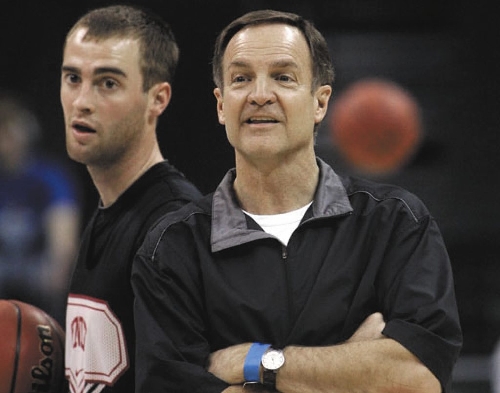Fiction masks fact in Rebels recruiting


The house is on fire. The bridge has collapsed. The world is ending.
Recruiting season again must be nearing its end for UNLV basketball.
Sorry. I don’t see it.
You can’t fairly judge a program’s recruiting in 2010 if you can’t accept its place in the sport’s landscape. That’s difficult for most fans, impossible for some. It isn’t necessarily a bad thing. That’s what fans do. They think with their hearts.
“We care about everyone’s opinion, and generally the reception our program has received in Las Vegas has been terrific,” UNLV coach Lon Kruger said. “Every team has deficiencies. You’re not going to win all (recruiting battles). You’re going to lose more than you win. That’s the nature of the business.”
Fiction: Recruits should embrace UNLV’s past glory, and it should play a big part in their decision process.
Fact: It’s not 1990. UNLV isn’t close to the best program in America. It’s not even the best in the Mountain West Conference. The players UNLV recruits today not only don’t care about a national championship 20 years ago, but most weren’t born when it was won.
Cory Joseph signed with Texas because the Longhorns have a better program today, better facilities, play in a better conference, are part of a better TV deal and because the Findlay Prep point guard wanted to compete on a big-time stage that sends its players to the NBA. Texas is all that and more over most programs nationally.
Tradition apparently didn’t mean much to Bishop Gorman point guard Johnathan Loyd either, and his father played at UNLV.
Loyd chose Oregon over the Rebels because he will see more immediate playing time than had he signed with a UNLV team whose best player on many nights (Oscar Bellfield) has two years of eligibility remaining.
Kids want to play now. The Ducks offered a better chance at it. They were a better fit. Sometimes, it’s that simple.
None of this means UNLV should ever settle or stop pursuing the nation’s top recruits. It should never for a second stop believing the sort of success found by Butler this past Final Four can’t also happen at UNLV again.
But those who can accept how difficult it is to win consistently and how much good fortune it takes to reach a championship level can grasp why and how many recruiting battles play out. Those who can’t don’t.
Fiction: Kruger can’t recruit quality big men.
Fact: How many of them do you truly believe are out there each year at the high school level? Seriously. The few great ones often don’t attend college at all any more and those a cut below have committed to Kentucky or North Carolina or Connecticut and the like before their senior season ever commences.
More often than not, post players in college are undersize bodies developed by coaches to whatever level their skill set allows.
It’s true UNLV hasn’t been good inside of late. Hasn’t been near physical enough. Hasn’t been able to throw the ball in the post and expect consistent positive results.
But shouldn’t the young centers in the program today at least be given the chance to develop before they’re labeled busts?
Brice Massamba was far better as a sophomore than a freshman. Why would anyone believe such growth will end? Carlos Lopez hasn’t played a minute in college. Who is anyone to say how good or bad he might prove?
Fiction: UNLV doesn’t sign athletic enough players.
Fact: Absolutely. Kruger gets the most out of his team’s talent better than any MWC coach, but there are nights when you look on the court and the difference in athleticism is obvious. There are several reasons Kruger has never had a UNLV player test the NBA Draft waters early, and one is they just haven’t been athletic enough to make it a serious option.
Fiction: UNLV has turned into Transfer U.
Fact: And the problem is?
Look. If you get the right transfers — kids with little baggage, good players, ones who won’t embarrass your program — winning is just as sweet with them as it is with prep recruits. Some transfers hit big. Others don’t.
Tre’Von Willis is a darn good college player. So is Chace Stanback. We don’t know yet about Quintrell Thomas or someone like Mike Moser, who in 2011 will need to prove he’s better than a player who could barely get off the bench for one of the worst UCLA teams in recent times.
But the house isn’t on fire. The world isn’t ending. UNLV has every chance to be a Top 25 team next season and advance in the NCAAs.
That might not have been considered good enough in 1990, but given how the landscape has changed, it should be in 2010.
At least to the reasonable mind.
If you can find one.
Las Vegas Review-Journal sports columnist Ed Graney can be reached at egraney@reviewjournal.com or 702-383-4618.












